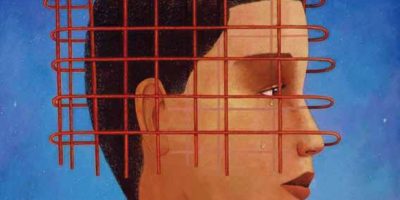Secular Religious Novels
The gaze of outsiders upon modern observant Jewish life
Romantic upheaval and family drama attain richer focus when seen through the eyes of newfound religious piety. Gone to the Dogs by Mary Guterson (St. Martin’s Press, $13.99) and You or Someone Like You by Chandler Burr (Ecco/HarperCollins, $25.99) depict heroines struggling to make sense of their love and family lives, while newly observant relatives look on.
In Gone to the Dogs, Rena is a young career waitress living in an unbelievably messy apartment and recuperating from an abrupt breakup with her mountainclimbing boyfriend. The book’s central conceit: she kidnaps her ex’s dog, or, as she introduces the scenario, “I invited [him] over and he very kindly accepted my invitation.” Thus begins a screwball narrative where Rena surreptitiously stalks her ex and embarks on awkward blind dates, punctuated by hilarious family dinners with her divorced parents and her Orthodox sister Aviva. We first meet Aviva bewigged in her Orthodox home, when she tries to orchestrate a setup between her secular sister and Chaim — who had “what appeared to be a full head of dark curly hair — you never know what might be lurking beneath the skullcap.” When Chaim reveals that he tends to go by “Chuck” and that the kippah was an act for the dinner party, he and Rena begin a tentative courtship, bonding over the artifice of religion that brought them together. Aviva, in the meantime, is going through her own drama — should she (gasp) stop wearing her wig? — and this crisis of faith brings the two sisters closer.
Gone to the Dogs is a quick and easy read, perfect for beaches or a lazy afternoon. Chandler Burr’s You or Someone Like You, in contrast, is a thickly layered literary novel of a complicated family in Hollywood, told through the articulate and painwracked voice of the literature Ph.D. Anne Rosenbaum. Anne is middle-aged, British, blonde and underemployed, intermarried to the colossally successful film producer Howard. The charismatic Howard has left his Jewish upbringing behind in Brooklyn, preferring the life of secular words and beautiful people, whom he captivates at dinner parties with rhymed retellings of Shakespeare. Anne, meanwhile, spends her time coordinating a “great books” group for the Hollywood elite and keeping an eye on their teenage son, Sam.
The novel’s tension comes to a head when Sam stumbles back home after a disastrous trip to Israel, having been expelled from yeshiva after his “wronghalf ” Jewish status is revealed. Howard sees his son’s trauma as a call back to his own childhood faith, and he leaves his marriage to pursue the Orthodox path. What follows is Anne’s descent into desperate anger, defending her son (who has his own secrets) and railing against the Jewish establishment. It’s rare to see this character in a modern novel: the non-Jew resenting the exclusivity of Jewish privilege and tribalism, uncomfortable with the knowledge that her husband loves their child because he looks like her. It’s a tribute to Burr’s deft skills that Anne remains so sympathetic a character, even when spouting remarks so critical of Jews and Judaism. What makes the novel even more unique is its narrative voice: Howard and Anne quote Donne, Eliot, Joyce back and forth, using literature to illuminate their inner worlds. Read as a pair, these novels paint a picture of modern observant Judaism from the outsider’s gaze: how it keeps some out, even as it holds others close.
Sara N. S. Meirowitz writes, edits, teaches, and memorizes poetry in Jerusalem.


